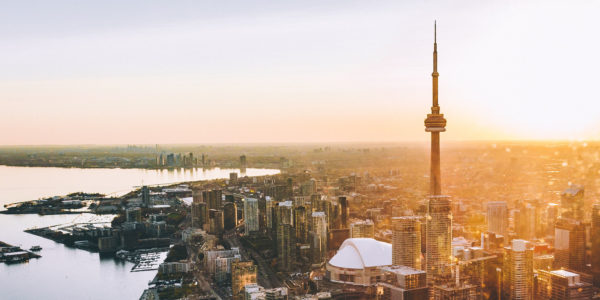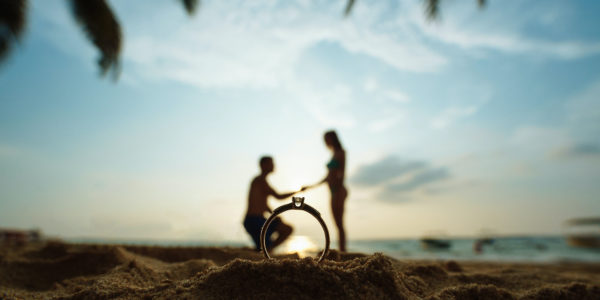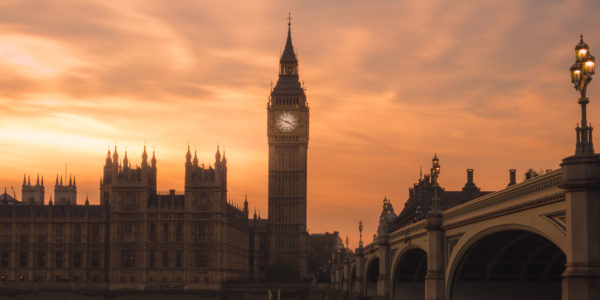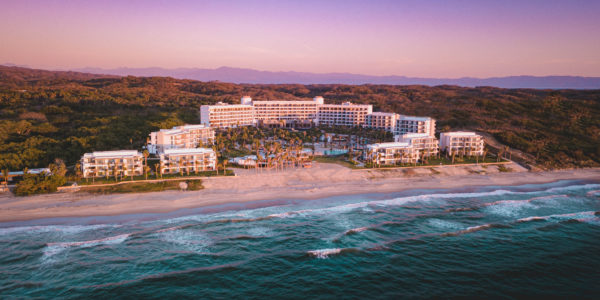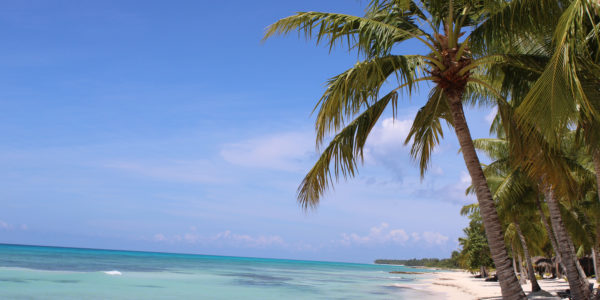We are viragoes, hear us roar.
Virago – A rarely used word that at its root is as inspiring as the women it represents. It comes from the Latin word virāgō. Vir meaning man-like and vigorous. The suffix -āgō makes it feminine. Not quite the implied charm, but what it essentially means is hero-like. A female warrior, a female counterpart to the impressive moniker of the hero. History is marked by women who embodied exactly these sentiments. It’s a word we ought to take back into our vocabulary and wear proudly.
The history of women in travel is marked by achievements. Women kicking ass in some of the harshest environments, formidable climates, and isolated destinations — at times much to the chagrin and disbelief of their male colleagues. Many women have boldly go where no one has gone before, climbing Everest, sailing the seven seas, flying around the world in 80 days.
Here is a list of some of the most incredible women in travel history, those who wandered, discovered, conquered, and observed the world for the first time, in new and inspiring ways. They conquered the unknown, and battled to break records. They paved the way for the freedoms we enjoy today, reminding women everywhere that we can do what we like, whenever we want, and with whomever we choose. Which in many circumstances is entirely and completely our incredible, independent, world-defeating, solo selves.
Amelia Earhart
The first woman to fly solo across the Atlantic – and also the second person ever
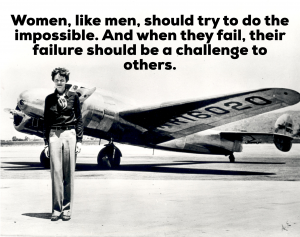
She is one of the greatest and most well-known women in travelling history. It only took one flight for Earhart to realize her passion was in the sky, and she eventually saved up to buy a yellow bi-plane she named ‘The Canary’.
From then on, Amelia Earhart spent her life breaking records. From altitude, to speed, to distance, she was a force to be reckoned with. In 1922, she was the first woman to attempt flying solo above 14,000 feet.
She immediately made a name for herself by becoming the first woman, and only the second person ever, to complete a non-stop solo trip across the Atlantic ocean from Newfoundland, Canada, to Wales in the United Kingdom.
She was also a fierce writer, activist, and protestor, regularly advocating for women’s rights.
She was tragically lost at sea somewhere over the Pacific Ocean in 1937, though she died doing what she was best at.
Amelia Earhart is an epic reminder to live your best life, and prove all the naysayers wrong while you’re at it. If you believe you can do it, you probably can, and better than anyone who attempts to say otherwise.
Jeanne Baret
The Mulan of French wayfaring
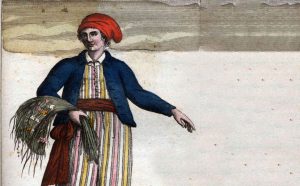
Jeanne Baret became the first woman to circumnavigate the globe from 1766 to 1769, and she did it all while concealing her sex.
Baret grew up in the Loire Valley, a temperate area in central France known more for producing farmers than sailors.
Her proclivity for nature was noticed by the botanist Dr. Philibert Commercon, and she was invited to assist him on the first French expedition around the globe.
She sailed 6 oceans and discovered more than 70 plant species on her maiden voyage, as well as collecting over 6,000 botanical specimens from around the world. She would wrap linen around her chest and wear loose fitting clothing to conceal her curves.
She maintained the facade for two years, a lofty feat considering she was travelling on a ship in close quarters with 116 men.
Nellie Bly
Around the Word in 72 Days
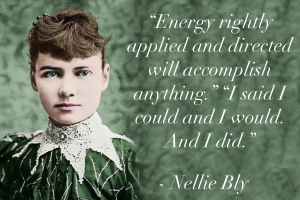
Nellie Bly, or Elizabeth Jane Cochran, was a force to be reckoned with. She was no stranger to breaking rules, beating records, and making a name for herself in controversial causes.
She once willingly checked herself into a mental hospital to expose the cruelty of institutions, dealing with shocking treatment in the process.
After reading Jules Verne’s Around the World in 80 Days, she decided she could beat that number. The current record holder was Elizabeth Bisland, another inspiring femme who had completed the journey in 75 days.
So Nellie set her sights on the 75-day target.
Ultimately she managed to circumnavigate the world by train, ship and on horseback in just 72 days.
What a woman.
Aloha Wanderwell
The first woman to drive around the world
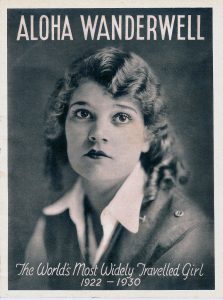
With a name like that, you’d think more people would remember Aloha Wanderwell. Setting aside her incredible accomplishment of being the first woman to drive around the entire world, there’s an even more startling fact:
she was only 16 at the time.
Aloha joined “Captain” Walter Wanderwell in a race against time to visit all the countries in the world, a journey of more than 380,000 miles, over 43 countries and across 4 continents. Eventually, she would visit 80 countries over 7 years.
Their only companions were a camera crew and a pet monkey named Chango. (Coincidentally, Chango became the first monkey to travel around the world).
You can read about her journey in her wonderfully vivid memoir Call to Adventure. Aloha was also renowned photographer, cinematographer and translator in the 20s and 30s thanks to her colourful and adventurous lifestyle, documenting places and experiences most people of the time could only dream of.
Jane Goodall
A queen among the wildlife
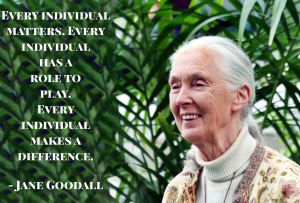
Jane Goodall is perhaps best known as the pioneering animal activist that brought us closer to understanding our closest relative – the chimpanzee. Her travelling passion began to grow in full force from the young age of 10, when she would spend her time reading books like Dr Doolittle and Tarzan, dreaming of life in the wild of Africa.
She worked towards her dream, and ultimately spent over half a century researching and observing the magnificent chimpanzees in Gombe Stream National Park in Tanzania, documenting her astounding discoveries and opening up a world of knowledge to her fellow humans.
Valentina Tereshkova
The first woman in space
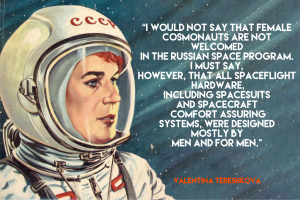
‘Hey sky, take off your hat, I’m on my way’!
Valentina was the first woman in history truly to go where no woman had gone before.
On 16 June, 1963, the Russian cosmonaut blasted off into space at a mere 26 years old. Flying 1.2 million miles in total and orbiting the Earth 48 times during her solo mission.
By the time she returned to the ground, her hours in space amounted to more than every American spaceman combined.
These days, the 82-year-old is an advocate for women’s rights.
She also insists she would accept another one-way mission to Mars in a heartbeat.
Freya Madeline Stark
The first Western woman to explore Luristan in Iran
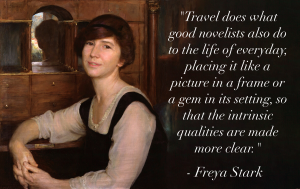
‘Go to risky places, go alone, and remark on what you find there’. This was practically the motto of the late, great Freya Stark, who died at the ripe old age of 100, having lived a life richer than most.
Stark explored some of the world’s most inhospitable regions. Along the way, she wrote evocative travel literature to inspire a world of intrepid dreamers who might follow her.
Her body of work includes The Valley of the Assassins, The Hadhramaut, Letters from Syria, Beyond Euphrates, Riding to the Tigris, and The Minaret of Djam. She’s known for engaging accounts of people and places told in vivid prose with sensitivity that sinks deep into the human connections she made on her travels.
She would carry Austen and Virgil in her luggage, wearing Dior in the far reaches of Asia and Arabian gowns in the West. Her heroism could not be hampered by gender, age, or time.
At the time of her death, Italian newspapers referred to her as ‘la Regina nomade,’ the Queen nomad; and what a queen of the times she was.
Alice Ramsey
The first woman to drive across the U.S.
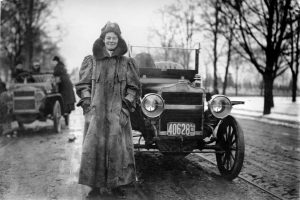
At 22 years old, Alice Ramsey was a trailblazer. In 1909, living in a world where most women didn’t even know how to drive a vehicle, Alice found her passion was etched on the open road.
She became the first woman to drive the length of the United States, from New York on the eastern border to San Francisco on the West Coast.
It took her just 59 days to navigate through terrain infinitely more perilous than it is today, along unsealed roads and gravel highways. This dauntless trip made her the first woman to be commemorated in the Automotive Hall of Fame.
Robyn Davidson
Writer, traveller, and desert conquerer
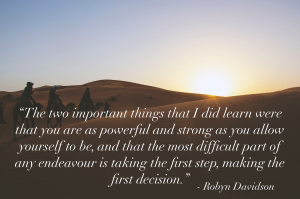
Robyn Davidson was no stranger to the feeling of restlessness, and from this emotion stemmed her decision to traverse the desert from the Northern Territory of Australia to the coast of the Indian ocean. She trekked across the ‘transcendent landscape’ with only camels and a dog for company.
Over nine months, the 1,700-mile trek was challenging, life-changing and triumphant.
She battled fierce landscapes, extreme climates, and the adverse effects of dehydration. Her journey was documented as a compelling adventure story in National Geographic, though much to her chagrin — at least at first.
She later recorded her entire journey in her book Tracks, which captured the hearts of many when it was immortalized in film in 2013.
Junko Tabei
The first woman to conquer Everest in an all-female expedition
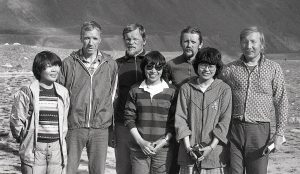
In 1975, the 5 foot tall, 35-year-old Japanese climber Junko Tabei was leading an expedition of skilled mountaineering women to the summit of Everest. It was the 70s, and most Japanese women were still serving tea while the men labored.
It was very unexpected as far as society was concerned, for a woman even to entertain the thought of climbing mountains, let alone the highest summit in the world.
So pioneering the Ladies Climbing Club was infinitely praiseworthy.
Even more unexpectedly, Tabei was also mother to a daughter, who turned three while her mother was climbing to the summit.
Despite society’s expectations that women should be at home with the children and not out in the wilderness breaking records, Tabei went on to be the first woman to scale the seven highest peaks on each continent.
When she turned 76, she had scaled 76 mountains. Unfortunately, she also suffered from cancer and died a year later, but her legacy remains strong in Japan.
Laura Dekker
The youngest person to sail around the world, solo
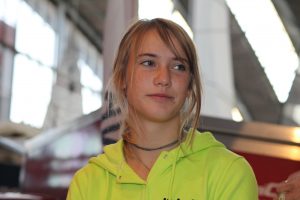
Laura Dekker had a dream: to live a life at sea and sail around the world.
She completed her goal, singlehandedly, at age 14. It’s a remarkable feat that makes it all the more astonishing that she had to first battle social services in court to enable her to set sail, even with her parents’ blessings.
In 2010, she set sail from Gibraltar in a 12-meter, bright red Ketch called Guppy. Her journey ended two years later in Whangarei, New Zealand. It was the port where she was born (during a 7-year voyage where during which her parents circumnavigated the globe by sea).
Ultimately, she spent 518 days alone on the open ocean, simultaneously keeping up with homework and learning how to play the flute. She documented her journey on her blog, Maidentrip, as well as in her book, One Girl One Dream.
She’s also the founder of the Laura Dekker World Sailing Foundation, which fundraises to build ships to teach children necessary life skills she feels are not being taught in the regular school system. She’s also still living life like a happy pirate on her boat.
She has sailed over 50,000 nautical miles and counting.
Cheryl Strayed
Traveller, writer, and inspirer
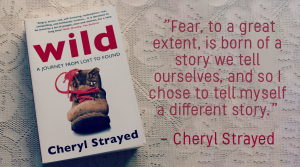
Cheryl Strayed reminds us all that it is entirely possible to battle demons and mountains all at once, and win. For years, Cheryl racked up miles travelling the US in her 1979 Chevy LUV pickup named Myrtle.
But she is best known as a badass female traveler for hiking the Pacific Crest Trail, an arduous three-month journey from Mexico to Canada. She documented this trek in her wildly witty yet poignant memoir Wild: A Journey from Lost to Found. Her bibliography also includes the compelling Tiny Beautiful Things and Brave Enough. She inspires thousands of women to get out into the wilderness, to conquer fears inside and out, and ignite passions of their own.
Harriet Chalmers Adams
Founder of the Society of Women Geographers
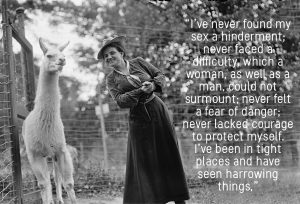
The headstrong Harriet Chalmers Adams paved the way for a generation of women in the geographical field. She spent much of her life on the road, her first forays taking her to Mexico, the Andes, the Amazon, and the West Indies.
Despite her intrepid nature, she was refused involvement in a men’s only explorer’s club. Instead, she founded the Society of Women Geographers, and the rest was history.
In an interview with The New York Times in 1912, she quipped, ‘I’ve never found my sex a hindered; never faced a difficulty which a woman, as well as a man, could not surmount; never felt a fear of danger; never lacked the courage to protect myself’.
Maureen Wheeler
The creator of the world’s biggest travel guide

Maureen Wheeler is one half of the creative team that inspired millions of people around the world to travel. She and her husband backpacked from the UK to Australia in the 70s, back when beaches in South East Asia remained blissfully undiscovered and hostels in Europe were few and far between.
Inspired by their journey, in 1972, Maureen and her husband Tony wrote a guidebook they named Across Asia on the Cheap. It was the beginning of something truly special, and eventually Lonely Planet was born.
Today, it’s arguably the world’s biggest travel guide series, reminding the world that travel wasn’t just for rich, privileged people.
After starting their family on the road, Maureen went on to write Travel With Children, encouraging parents everywhere to travel with their families in tow.
Annie Smith Peck
The first woman to summit Mount Huascarán
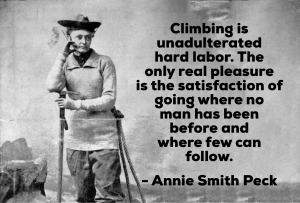
Annie Smith Peck left awe in her wake and legend in her footsteps, a 19th century virago of epic proportions, carving a path for women everywhere to achieve feats that it was deemed only men could attain. She would be photographed as a femme fatale, wearing brooches, silken shirts and veiled hats before expeditions.
She would then change into trousers, wield an ice axe, and conquer the world’s most treacherous mountains.
Alas, the newspapers focused more on her trouser wearing escapades over her mountain climbing endeavours.
But in 1910, after already gathering a tremendous catalogue of traverses, she became the first-ever climber to ascent the highest point of Mount Huascarán in Peru — at age 58!
Her epitaph reads, ‘You have brought uncommon glory to women of all time’. And there are few women more worthy of the sentiment.

